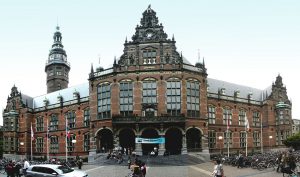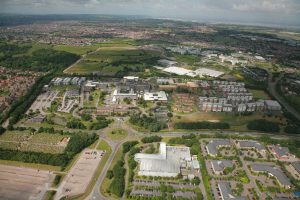University of Bayreuth
 The University of Bayreuth was founded 1975 and is a hub of international and interdisciplinary research and one of few German universities with a cluster of excellence which is called “Bayreuth International Graduate School of African Studies” (BIGSAS). SELFCITY is strongly linked to the Research Center BayCEER which addresses global change issues.
The University of Bayreuth was founded 1975 and is a hub of international and interdisciplinary research and one of few German universities with a cluster of excellence which is called “Bayreuth International Graduate School of African Studies” (BIGSAS). SELFCITY is strongly linked to the Research Center BayCEER which addresses global change issues.
The Department of Geography is dealing with cross-cutting themes as sustainable regional and urban development, human-environment interaction and political ecology. A further focus is spatial qualitative social research and participatory methods.
University of Groningen
 The University of Groningen is one of the oldest universities in the Netherlands (founded in 1614) as well as one of its largest. The Department of Spatial Planning and Environment has a research agenda concentrating on the relationships between institutional innovation and spatial transformation.
The University of Groningen is one of the oldest universities in the Netherlands (founded in 1614) as well as one of its largest. The Department of Spatial Planning and Environment has a research agenda concentrating on the relationships between institutional innovation and spatial transformation.
The team is focusing on urban regions in transition, civil initiatives and resources and flows.
University of the West of England
 The University of the West of England (UWE) is one of Britain’s most popular universities and the largest provider of higher education in the Southwest of England. The UWE is committed to using academic knowledge and skills to offer practical solutions.
The University of the West of England (UWE) is one of Britain’s most popular universities and the largest provider of higher education in the Southwest of England. The UWE is committed to using academic knowledge and skills to offer practical solutions.
The Centre for Sustainable Planning and Environment (R. Atkinson and S. Hall) is a multi-disciplinary group of researchers interested in the planning, design, use and governance of places at different scales. The Bristol Economics Research Cluster (I. Smith) cluster brings together a diverse range of knowledge and research backgrounds to deliver pragmatic solutions and high quality analysis backed up by academic rigour.
KlimaKom
 KlimaKom is a registered co-operative for consultation of municipalities, which developed as a spin-off 2010 from an established enterprise. KlimaKom works out strategies and action plans for climate protection and energy transition in German municipalities, counties and regions with participative methods, integrating local citizens, experts, utilities and political/administrative representatives.
KlimaKom is a registered co-operative for consultation of municipalities, which developed as a spin-off 2010 from an established enterprise. KlimaKom works out strategies and action plans for climate protection and energy transition in German municipalities, counties and regions with participative methods, integrating local citizens, experts, utilities and political/administrative representatives.
